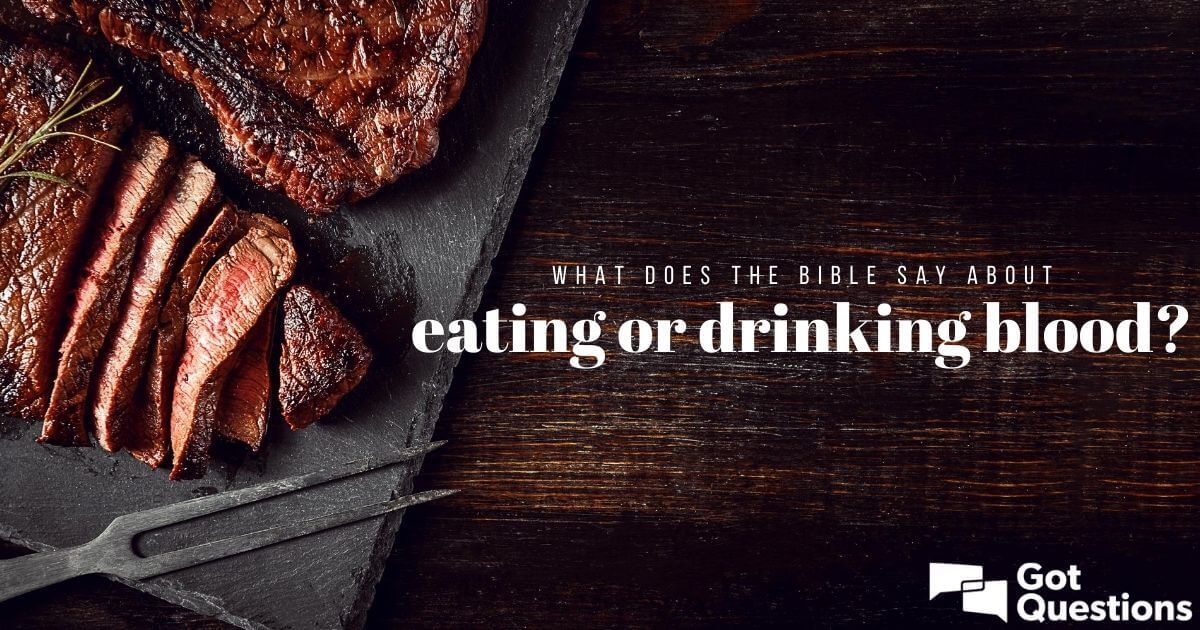Goodboy
Just waiting for the Rapture at this point!
Shall Not Eat the Blood
Does the Bible teach that we should…
A. Not eat any blood that comes from an animal?
or
B. Not to eat the animal while it is alive?
If A is true, then we should not be eating rare steak.
Looking at the first definitions of the Hebrew words for "Flesh", "Life", and "Blood" in Genesis 9:4, it would seem to me that the Bible speaks of not eating an animal while it was alive.
King James Bible
Genesis 9:4 But flesh with the life thereof, which is the blood thereof, shall ye not eat.
King James Bible with Strong’s Concordance
Genesis 9:4 But flesh H1320 with the life H5315 thereof, which is the blood H1818 thereof, shall ye not eat.
Flesh H1320 meaning
flesh (from its freshness); by extension body, person; also (by euphemism) the pudenda of a man: - body, [fat, lean] flesh [-ed], kin, [man-] kind, + nakedness, self, skin.
Life H5315 meaning
properly a breathing creature, that is, animal or (abstractly) vitality; used very widely in a literal, accommodated or figurative sense (bodily or mental): - any, appetite, beast, body, breath, creature, X dead (-ly), desire, X [dis-] contented, X fish, ghost, + greedy, he, heart (-y), (hath, X jeopardy of) life (X in jeopardy), lust, man, me, mind, mortality, one, own, person, pleasure, (her-, him-, my-, thy-) self, them (your) -selves, + slay, soul, + tablet, they, thing, (X she) will, X would have it.
Blood H1818 meaning
blood (as that which when shed causes death) of man or an animal; by analogy the juice of the grape; figuratively (especially in the plural) bloodshed (that is, drops of blood): - blood (-y, -guiltiness, [-thirsty]), + innocent.
While I have stated my thoughts, I really ask this as a question.
Goodboy
Does the Bible teach that we should…
A. Not eat any blood that comes from an animal?
or
B. Not to eat the animal while it is alive?
If A is true, then we should not be eating rare steak.
Looking at the first definitions of the Hebrew words for "Flesh", "Life", and "Blood" in Genesis 9:4, it would seem to me that the Bible speaks of not eating an animal while it was alive.
King James Bible
Genesis 9:4 But flesh with the life thereof, which is the blood thereof, shall ye not eat.
King James Bible with Strong’s Concordance
Genesis 9:4 But flesh H1320 with the life H5315 thereof, which is the blood H1818 thereof, shall ye not eat.
Flesh H1320 meaning
flesh (from its freshness); by extension body, person; also (by euphemism) the pudenda of a man: - body, [fat, lean] flesh [-ed], kin, [man-] kind, + nakedness, self, skin.
Life H5315 meaning
properly a breathing creature, that is, animal or (abstractly) vitality; used very widely in a literal, accommodated or figurative sense (bodily or mental): - any, appetite, beast, body, breath, creature, X dead (-ly), desire, X [dis-] contented, X fish, ghost, + greedy, he, heart (-y), (hath, X jeopardy of) life (X in jeopardy), lust, man, me, mind, mortality, one, own, person, pleasure, (her-, him-, my-, thy-) self, them (your) -selves, + slay, soul, + tablet, they, thing, (X she) will, X would have it.
Blood H1818 meaning
blood (as that which when shed causes death) of man or an animal; by analogy the juice of the grape; figuratively (especially in the plural) bloodshed (that is, drops of blood): - blood (-y, -guiltiness, [-thirsty]), + innocent.
While I have stated my thoughts, I really ask this as a question.
Goodboy

